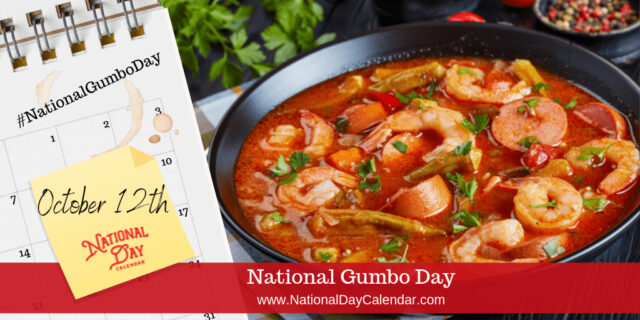
A heavily seasoned, stew-like dish is in the spotlight on National Gumbo Day which is annually observed on October 12. Originating in southern Louisiana during the 18th century, Gumbo is a dish that typically consists of a strongly flavored stock, meat or shellfish, a thickener, and seasoned vegetables. The seasoned vegetables may include celery, bell peppers, and onions which are a trio known in Cajun cuisine as the “holy trinity. The dish is commonly served over rice.
- Gumbo arose from a West African word for okra, ki ngombo, which many believe is how the name and the ingredient are also intertwined.
- Gumbo is thought to have been first documented in 1802 and was listed in various cookbooks in the latter 19th century.
- No one is certain of the dish’s origin; the oldest mention is by French explorer C.C. Robin on the Acadian coast in 1803.
- In 1803, gumbo was served at a gubernatorial reception in New Orleans
- It gained widespread popularity in the 1970s when the United States Senate cafeteria added Gumbo to the menu in honor of Louisiana Senator Allen Ellender.
- Gumbo is the official cuisine of the state of Louisiana.
- Since 1989, New Iberia, Louisiana has held The World Championship Gumbo Cook-Off.
- There are several different varieties of gumbo based on the type of thickener used to create the dish.
- Creole gumbo contains shellfish and tomatoes whereas Cajun gumbo is generally spicier with shellfish or chicken.
- Gumbo has flavors rooted in Native American, African, Caribbean, Spanish, and French cuisines.
- Gumbo is usually called a Cajun dish, but there are both Cajun and Creole varieties. Cajun refers to a group of people of French descent who migrated to Louisiana in the 18th century after they were expelled from the Northeast by the British.
- The term Creole can refer to both people of mixed descent and those of French or Spanish descent born in the New World.
- The roots of gumbo do run deep in Louisiana. Enslaved Africans were brought to the French colony in large numbers starting in 1719, and by 1721 more than half the residents of New Orleans were African.
- The first known reference to gumbo as a dish was uncovered by historian Gwendolyn Midlo Hall, who found a handwritten transcription of the interrogation of a 50-year-old slave named Comba in New Orleans in 1764. Suspected of being associated with other slaves who had stolen clothes and a pig, Comba is asked whether she had given a slave named Louis un gombeau, and she replies that she did.
Sources:












